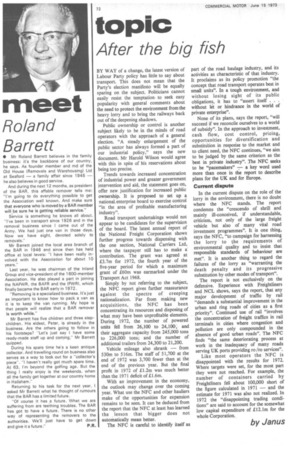topic
Page 74

If you've noticed an error in this article please click here to report it so we can fix it.
After the big fish
BY WAY of a change, the latest version of Labour Party policy has little to say about transport. This does not mean that the Party's election manifesto will be equally sparing on the subject. Politicians cannot easily resist the temptation to seek easy popularity with general comments about the need to protect the environment from the heavy lorry and to bring the railways back out of the deepening shadows.
Public ownership or control is another subject likely to be in the minds of road operators with the approach of a general election. "A steady enlargement of the public sector has always formed a part of our industrial policy," says the new document. Mr Harold Wilson would agree with this in spite of his reservations about being too precise.
Trends towards increased concentration of industrial power and greater government intervention and aid, the statement goes on, offer new justification for increased public ownership. It is proposed to set up a national. enterprise board to exercise control "in the area of profitable manufacturing industry".
Road transport undertakings would not appear to be candidates for the supervision of the board. The latest annual report of the National Freight Corporation shows further progress towards dispensing with the one section, National Carriers Ltd, where the taxpayer still has to make a contribution. The grant was agreed at £3.7m for 1972, the fourth year of the five-year period for which a maximum grant of £60m was earmarked under the Transport Act 1968.
Simply by not referring to the subject, the NFC report gives further reassurance against the spectre of creeping nationalization. Far from making new acquisitions, the NFC has been concentrating its resources and disposing of what may have been unprofitable elements. During 1972, the number of powered units fell from 26,100 to 24,100, and their aggregate capacity from 245,000 tons to 226,000 tons; and the number of additional trailers from 24,300 to 21,200.
Vehicle mileage also shrank — from 530m to 516m. The staff of 51,700 at the end of 1972 was 3,700 fewer than at the end of the previous year. But the final profit in 1972 of £1.2m was much better than the 1971 deficit of £1.6m.
With an improvement in the economy, the outlook may change over the coming year. What use the NFC and other hauliers make of the opportunities for expansion remains to be seen. It can be deduced from the report that the NFC at least has learned the lesson that bigger does not automatically mean better.
The NFC is careful to identify itself as
part of the road haulage industry, and its activities as characteristic of that industry. It proclaims as its policy promotion "the concept that road transport operates best in small units". In a tough environment, and without losing sight of its public obligations, it has to "assert itself . . without let or hindrance in the world of private enterprise".
None of its plans, says the report, "will succeed if we reconcile ourselves to a world of subsidy". In the approach to investment, cash flow, cost control, pricing, opportunities for diversification and substitution in response to the market and to client need, the NFC continues, "we aim to be judged by the same criterion as the best in private industry". The NFC seeks to be "pacemakers" = a key word used more than once in the report to describe plans for the UK and for Europe.
Current dispute
In the current dispute on the role of the lorry in the environment, there is no doubt where the NFC stands. The report condemns the "crescendo of shrill and mainly ill-conceived, if understandable, criticism, not only of the large freight vehicle but also of many vital road investment programmes". It is one thing, says the NFC, "to campaign for harnessing the lorry to the requirements of environmental quality and to insist that responsible standards of behaviour are met". It is another thing to regard the failures of the lorry as "warranting the death penalty and its progressive substitution by other modes of transport".
The report is not exclusively on the defensive. Experience with Freightliners and NCL shows, says the report, that any major development of traffic by rail "demands a substantial improvement in the urban and ring roads of cities as a first priority". Continued use of rail "involves the concentration of freight traffics in rail terminals in cities where congestion and pollution are only compounded in the absence of good urban roads". The NFC finds "the same deteriorating process at work in the inadequacy of many roads serving UK ports providing ro/ro services".
Like most operators the NFC is disappointed with the results for 1972. Where targets were set, for the most part they were not reached. For example, the number of containers carried by Freightliners fell about 100,000 short of the figure calculated in 1971 — and the estimate for 1971 was also not realized. In 1972 the "disappointing trading conditions" are said to account for the somewhat low capital expenditure of £12.1m for the whole Corporation.
by Janus












































































































































